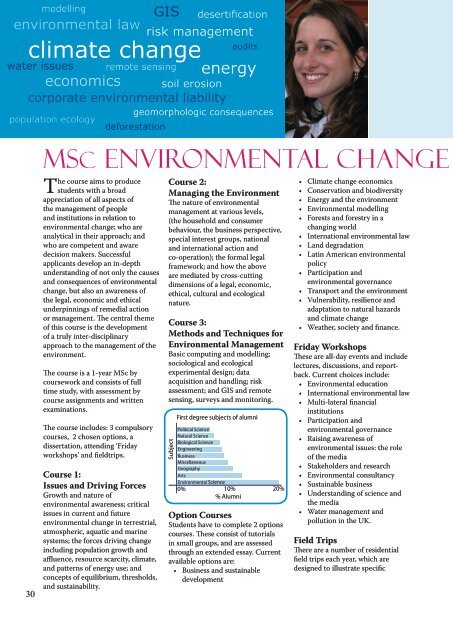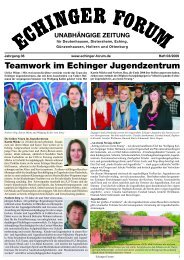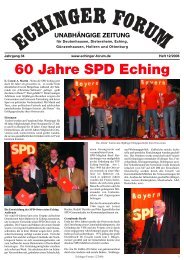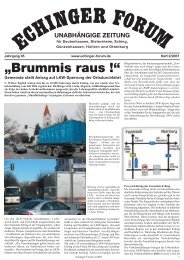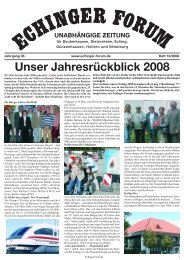Büro Karl Holmer Sachverständiger für Kraftfahrzeuge - Echinger Forum
Büro Karl Holmer Sachverständiger für Kraftfahrzeuge - Echinger Forum
Büro Karl Holmer Sachverständiger für Kraftfahrzeuge - Echinger Forum
You also want an ePaper? Increase the reach of your titles
YUMPU automatically turns print PDFs into web optimized ePapers that Google loves.
environmental law<br />
water issues<br />
0<br />
modelling<br />
economics<br />
GIS<br />
desertification<br />
risk management<br />
climate change<br />
remote sensing<br />
audits<br />
energy<br />
soil erosion<br />
corporate environmental liability<br />
geomorphologic consequences<br />
population ecology<br />
deforestation<br />
MSc Environmental change<br />
The course aims to produce<br />
students with a broad<br />
appreciation of all aspects of<br />
the management of people<br />
and institutions in relation to<br />
environmental change; who are<br />
analytical in their approach; and<br />
who are competent and aware<br />
decision makers. Successful<br />
applicants develop an in-depth<br />
understanding of not only the causes<br />
and consequences of environmental<br />
change, but also an awareness of<br />
the legal, economic and ethical<br />
underpinnings of remedial action<br />
or management. The central theme<br />
of this course is the development<br />
of a truly inter-disciplinary<br />
approach to the management of the<br />
environment.<br />
The course is a 1-year MSc by<br />
coursework and consists of full<br />
time study, with assessment by<br />
course assignments and written<br />
examinations.<br />
The course includes: 3 compulsory<br />
courses, 2 chosen options, a<br />
dissertation, attending ‘Friday<br />
workshops’ and fieldtrips.<br />
Course 1:<br />
Issues and Driving Forces<br />
Growth and nature of<br />
environmental awareness; critical<br />
issues in current and future<br />
environmental change in terrestrial,<br />
atmospheric, aquatic and marine<br />
systems; the forces driving change<br />
including population growth and<br />
affluence, resource scarcity, climate,<br />
and patterns of energy use; and<br />
concepts of equilibrium, thresholds,<br />
and sustainability.<br />
Course 2:<br />
Managing the Environment<br />
The nature of environmental<br />
management at various levels,<br />
(the household and consumer<br />
behaviour, the business perspective,<br />
special interest groups, national<br />
and international action and<br />
co-operation); the formal legal<br />
framework; and how the above<br />
are mediated by cross-cutting<br />
dimensions of a legal, economic,<br />
ethical, cultural and ecological<br />
nature.<br />
Course 3:<br />
Methods and Techniques for<br />
Environmental Management<br />
Basic computing and modelling;<br />
sociological and ecological<br />
experimental design; data<br />
acquisition and handling; risk<br />
assessment; and GIS and remote<br />
sensing, surveys and monitoring.<br />
Subject<br />
First degree subjects of alumni<br />
Political Science<br />
Natural Science<br />
Biological Science<br />
Engineering<br />
Business<br />
Miscellaneous<br />
Geography<br />
Arts<br />
Environmental Science<br />
0% 10%<br />
% Alumni<br />
20%<br />
Option Courses<br />
Students have to complete 2 options<br />
courses. These consist of tutorials<br />
in small groups, and are assessed<br />
through an extended essay. Current<br />
available options are:<br />
• Business and sustainable<br />
development<br />
•<br />
•<br />
•<br />
•<br />
•<br />
•<br />
•<br />
•<br />
•<br />
•<br />
•<br />
•<br />
Climate change economics<br />
Conservation and biodiversity<br />
Energy and the environment<br />
Environmental modelling<br />
Forests and forestry in a<br />
changing world<br />
International environmental law<br />
Land degradation<br />
Latin American environmental<br />
policy<br />
Participation and<br />
environmental governance<br />
Transport and the environment<br />
Vulnerability, resilience and<br />
adaptation to natural hazards<br />
and climate change<br />
Weather, society and finance.<br />
Friday Workshops<br />
These are all-day events and include<br />
lectures, discussions, and report-<br />
back. Current choices include:<br />
•<br />
•<br />
•<br />
•<br />
•<br />
•<br />
•<br />
•<br />
•<br />
•<br />
Environmental education<br />
International environmental law<br />
Multi-lateral financial<br />
institutions<br />
Participation and<br />
environmental governance<br />
Raising awareness of<br />
environmental issues: the role<br />
of the media<br />
Stakeholders and research<br />
Environmental consultancy<br />
Sustainable business<br />
Understanding of science and<br />
the media<br />
Water management and<br />
pollution in the UK.<br />
Field Trips<br />
There are a number of residential<br />
field trips each year, which are<br />
designed to illustrate specific


